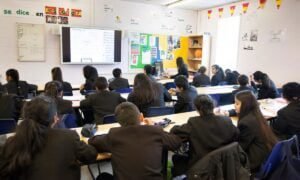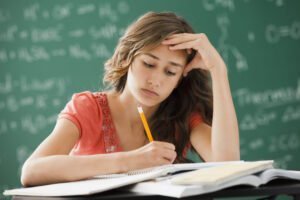Education and Teacher Quality
Quality education is the hope of rejuvenating the people. Improving the quality of teachers is the key to developing quality educators with creativity and an innovative spirit and promoting quality education. This article begins with the implications of quality education and focuses on an analysis of the current quality issues of our teachers.
After the Sino-Japanese War from 1894 to 1895, China’s reform ideas soared. The strict rehabilitation of contemporary educational thinkers in line with the times once proposed “education to save the country.” He believes that military and economic reforms such as “gaining power”, “actual military practices”, “mining”, “railway access”, and “commercial prosperity” are just “standards”.
I will. The “citizen quality”, the quality of the nation, which is the “foundation” that requires both symptoms and the root cause, but the focus is on curing the root cause to save the nation.
If education aimed at improving the quality of the people is stopped, not only will political changes such as “building democracy” and “opening of homes” not begin, but economic reform will become an empty story. It ends up. Porting an advanced political economy system can only be a “Huai Orange for Oranges”.
The transition of 100 years is also the turning point of the century. Sun Yunxiao’s article, Contest in Summer Camp, shocked the Chinese people and reignited widespread debate about quality education.
In today’s increasingly fierce international economic and technological competition, China’s national quality and national innovation capacity are in urgent need of improvement.
In a world where quality and innovative talents are strategically active in international competition, the lack of quality talent makes my country’s development difficult. “Quality education” has been repeatedly proposed for all kinds. ..
1. The connotation of quality education
Quality education is a whole new view of education that denies traditional exam-oriented education. When analyzing its implications, we must first examine and analyze China’s test-oriented education.
The prominent problems of traditional exam-oriented education are: It’s more than education, but not enough learning. More than indoctrination, inadequate inspiration.

More than transfer of knowledge, inadequate ability training. More than memorization ability, insufficient flexibility and adaptability. Insufficient development of innovative abilities beyond training of imitation abilities. This type of educational model significantly curbs the innovative awareness and abilities of educated people.
When it comes to quality education, there is not yet a unified definition in the areas of education and theory. However, the view generally accepted by experts and scholars is that the predisposition is internal, comprehensive and stable, formed on the basis of innate physiology through education and training, environmental influences, and individual efforts. It refers to individual behavior.
Quality mainly includes ideological and moral quality, cultural quality, professional quality and psychological quality. Therefore, quality education is not as simple as adding a few more courses. We need to establish our own fulcrum from a fundamental transformation of educational thinking.
The idea of quality education includes at least three elements: personality, ability, and research. Individuality can lead to innovation. Quality education focuses on discovering and nurturing a student’s individuality and individual potential, emphasizing that every student has their own value, and the extent that each student is allowed by his talent. Ability acquisition, which must be able to grow fully within, does not preclude the acquisition and acquisition of knowledge, especially the development of innovative abilities that require a rational knowledge structure.
Research is the closed phenomenon of “teachers teach for education, students learn for learning” caused by all innovations, especially the system that is the mother machine of higher education that breaks traditional education. Infiltrating into, learning is of the nature of research so that students can learn how to study problems and develop the habit of studying problems.
2. Dialysis of Teacher Quality
For a long time, universities in mainland China have been a significant weakness in fostering students’ innovative spirit and creativity. The concept of backward education does not help to show student initiative in learning.
A single mode of education does not encourage the development of student personality and the emergence of top-notch talent. The pedagogy is so dead that the crowded classroom and the phenomenon of injections are basically unchanged.
The test method and content will guide students reading a deadly book. Student evaluations are based primarily on course test scores to determine pros and cons, limiting students’ innovative awareness and creativity.
For example, linguistic texts need to be the most exciting imagination and creativity and are standardized.
The new stereotyped metaphysical education and exam system allows students to become more cautious, less tolerant of scholars, and more focused on shortcomings, not to mention innovative spirit and quality.
The quality of teachers has a direct impact on the quality of students. Whether teachers’ pedagogy, teaching methods, and student evaluation methods help foster student creativity is closely related to teacher quality.
In summary, the quality of Chinese teachers generally has the following issues:
1. Lack of democratic awareness
In developed country education, teachers and students are relatively equal and teachers need to respect their students like adults. And Chinese educators tend to curb and slow student psychological growth.
Obedience and obedience are considered “good qualities” that students should have. Not only are many teachers accustomed to “speaking” in class, but they also command students in an authoritative way outside of class. For example, if a teacher allows a student to participate in an activity, but the student refuses, the teacher typically uses “Join. Must attend.” And so on.
This situation is common on campus. Teachers have the right to give orders, but students have only the obligation to follow control. This phenomenon has been naturally associated with the Chinese Imperial Examination System for over 1000 years-both the feudal system and culture have recognized the teacher’s absolute authority over students.
In China today, the reform of the education system and the development of democratic education and culture lag behind other reforms (such as economic reforms). The reason why educational reform is at a standstill in reform is related to the peculiarity of the teacher-student relationship.
On the other hand, Chinese culture has a tradition of respecting teachers. People have religious beliefs and worship of education and teachers. On the other hand, compared to teachers, students are a weaker group of minors, and it is difficult to spontaneously create a sense of democracy and equality.
Calls for reforms in teacher-student relationships and teaching methods are often not directly from students, but from a small number of prophets interested in education.
Of course, in educational activities, it is necessary to consider the relationship between teachers and students as one, and it does not fall into the trap of either one. We must oppose both teacher-centricity and student-centricity. For example, at some universities in medieval Europe, teacher-student relationships were terribly hostile.
Students had the authority to manage teachers, who had to teach and manage according to the requirements of student officials. This relationship between teachers and students was contrary to the academic goals of the university. The decline and disappearance of this type of university.
Since the 1970s, as universities have become more democratized, the relationship between university teachers and students has undergone new changes.
For example, the Dutch government established the principle of equal power at universities in 1972. According to this, college students and teachers make joint decisions on college issues. This excessive democracy had undesired consequences, and the academic level of the university declined rapidly within a few years.
Student-teacher equality is at the level of law and human rights, not all aspects of management, curriculum and money management.
In other words, in school, teachers and students are equal, but have different responsibilities without confusion. Educational work should be teacher-led, student-centered, and advocate for full student initiative and creativity in learning.
2. Weak legal awareness
Many countries have always regarded the study of the Constitution and the basic implications of democracy, law and human rights as the first mission of education.
In school education in our country (especially primary and secondary education), this has little to do with it, and if any, it is almost empty and abstract. It is very common for teachers to rebuke and punish students in a disguised manner. Domestic newspapers once published such a news survey:
A fourth grade Chinese teacher and principal in elementary school punished one of his students 19 times a year and more than 100 times a year. This is often just a classic example. Newspapers and magazines in various locations often report that students may run away or even commit suicide if they do not submit their homework for fear of being scolded by the teacher.
Due to their young age, students lack a sense of self-defense. Frightened by authority, students should accept the teacher’s corporal punishment and not tell their parents, let alone use the law to protect themselves.
3. The level of teachers’ morality declines
“Being a teacher by others” is a traditional virtue of our teacher profession in all generations. To be a “teacher” you need to be knowledgeable and to be a “show” you have to be ethical. The ancient philosopher Confucius’s “Insatiable Learning, Relentless Teachings, Lessons and Actions, and Examples of Others” was the first to pioneer teacher morality.
Tao Xingzhi, a modern educator, was welcomed as a “human model.” He was willing to abandon his high position as a professor, abandon the comfortable and comfortable life in the city, and establish “rural education” in poor and rear rural areas to serve farmers. ..
He is disciplined, wants to learn, and believes that teachers must study and be educated every day to get the joy of teaching without the pain of teaching.
With the marketization of society, the moral standards of a significant number of teachers have declined. The phenomenon of teaching, using students, and wiping students for personal gain is common.
Students who do not pass the exam can give gifts to buy points or engage in “income generation” in the name of the makeup class. Corruption of education by authority is also common.
It is imperative to strengthen teachers’ ideological and moral quality education and strive to improve teachers’ ethics.
4. Poor psychological knowledge
In some elementary and junior high schools, some teachers often ridicule, discriminate, and humiliate, revealing shortcomings to poorly-performing students, mischief, disobedience, or sometimes negligent students. All of this puts a great deal of psychological pressure and harm on students.
Teachers are dissatisfied with their lives and bring them into the classroom and spit them out to their students. There is no shortage of such things. Teachers lack the understanding and psychological care of their students.
Many students develop negative personalities such as jealousy, fear of loss, comparison, vanity, indifference, conceit / inferiority complex, and snob in the school environment. This is unavoidable for so-called “good” students and can be even more serious.
Compared to adults, adolescents are psychologically vulnerable and less adaptable. Once traumatized, it is often difficult to heal. Some even get mentally ill and ruin their lives.
Psychological abuse of students by teachers is not only due to the roots of “teacher-based” ideology, but also to the lack of necessary psychological knowledge of teachers and the weakness of teachers’ personal and personality. Unpleasant students are psychologically abused because they are not physically punished.
Compared to physical trauma, mental trauma is latent and hidden, and the consequences are more serious.
To improve the quality of teachers, teachers have some knowledge and basic skills in educational psychology, are good at analyzing educational processes from a psychological point of view, and students from a psychological point of view.
They need to be able to learn and deal with understanding psychological characteristics of their own psychological problem recognition and adaptation.
3. The key to quality education is to improve the quality of teachers
The quality education facing the 21st century cannot be achieved without quality teachers. Seventy-five percent of general public junior high school teachers in the United States have a master’s degree.
In my country, 50% of full-time teachers with a master’s degree or above rarely reach a general university. This is just a disparity in the proportion of educational background, such as the innovative spirit, democratic consciousness, and legal system concept mentioned above, and will be even greater.
The plan a century ago is based on education. The grand plan of education is based on teachers. Teachers have the mission of spreading civilization, nurturing wisdom, and shaping the soul, and influence the future of people. Only teachers with an innovative spirit and a sense of innovation can provide heuristic education to students and develop innovative abilities.
Only teachers who understand the latest developments in current high-tech development can stand in the midst of a high-tech revolution and encourage their students to explore bravely. Teachers themselves have the ability to continuously learn and improve, so they can teach their students how to learn.

And only teachers who have a knowledge of educational psychology and a sense of democracy and legal system can develop a healthy personality for their students.
Education itself needs to be innovative in order to develop talents with innovative spirits and abilities, and teachers have innovative consciousness, innovative spirits and innovative abilities. is needed.
Principals and teachers are the key to the comprehensive promotion of quality education “(Speech by Minister of Education Chen Shiri at the closing ceremony of the National Working Council on Continuing Education and Principal Training for Elementary and Secondary Education Teachers).
4. Some thoughts and summaries on improving the quality of teachers
First of all, considering that teachers work with adaptable and immature children and adolescents. Its professional character and historical role require that the teacher be not only a knowledgeable person, but also a person of noble morality.

Therefore, educators need to be educated first and can only effectively use high standards to train their students if the teachers themselves reach high standards.
For members who have just joined the education team, pedagogy, educational psychology, and teachers’ professional ethics education should be fully implemented.
Second, the class teacher system needs to be revisited in light of power corruption. Some Western education systems do not have a principal, but instead use a counselor. This could be a reference for reforming our education system.
Third, manage the education team in accordance with the law. Currently, the state publishes a set of policies and regulations such as the Education Law, the Teacher Law, and the Higher Education Law.
It should be widely publicized among teachers and fully implemented. We must manage our education in accordance with the law and decide to deal with and punish the very few bad teachers who violence our students. Foster students’ awareness of self-defense and human rights. We oppose the phenomenon of deifying education and teachers.
Finally, we need to deepen the reform of the school’s personnel system and effectively improve teacher compensation. The low salaries of teachers have led to a significant loss of educational talent, filling many of the poor quality talents who are not educated.
“Being a good example” is not the same as “being willing to be poor.” People who are willing to be poor do not always have model qualities. If the education system requires teachers to be safe and poor, it only results in a shortage of teacher resources. And our system does not follow the principle of “queer than abuse”.
Therefore, the teaching profession can be a temporary or “containment” profession (the loser of other professional competition in society). Therefore, the school talent market can only become an “employment market” if teachers are treated relatively well and all kinds of concerns from society can be resolved through higher incomes.
At that time, if you want to find a position in school, you have to rely on the individual level and abilities can only be acquired through fierce competition. Only in this way can schools fundamentally escape the plight of today’s talent shortages, improve the quality of teachers and develop quality and innovative talents.
(Wu Hao is a research assistant at the Teacher Training Center at Anhui Agricultural University. ZiFei is a graduate student at the Faculty of Educational Psychology, University of Georgia, USA)
References
- Sun Yunxiao, Contest in Summer Camp, The Golden Age, Issue 7, 1993
- Edited by Xie Anbang and others, Higher Education, Beijing: Higher Education Press, 1998
- Editor-in-Chief Wu Xinchun, Higher Education Psychology, Beijing: Higher Education Press, 1998
- Works by Xie Sizhong, A Record of National Quality, Beijing: Writers Publishing House, 1997
- Zhou Daping, how to be a teacher today, half a month talk, Issue 7, 1999
- Shangguan Zimu, How to Treat Individual Differences in Students, Guangming Daily, June 16, 1999
- Sun Xiaofeng, Fang Xiaozhen, Teachers Colleges Should Become Models for Implementing Quality Education, China Education News, October 30, 1999
- Gordon E. Greenwood & H. Thompsom Fillmer: Educational Psychology Cases for Teacher Decision Making, 1999.

I am a professional content writer and currently working for a guest posting. My primary topics are home improvement & real estate!

